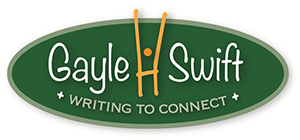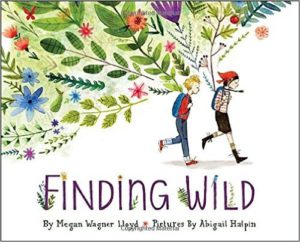Summer offers a break in routines, a chance to explore, relax, have adventures and spend time with family and friends. Kids can daydream, play, enjoy hobbies and use this break to discover things about themselves, their world and the people around them. Here are a few wonderful “summer reads” for kids. Each one is a winner.
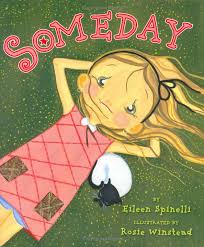 Someday by Eileen Spinelli and illustrated by Rosie Winstead strikes a dreamlike tone through its delicate collage illustration. Using a classic style of repetition, Spinelli highlights the broad possibilities pairing various Somedays and Todays. A young girl shares her dreams for the future and contrasts them with ways she spends her days. Unbridled imagination infuses her dreams for her future. But this celebration of possibility does not diminish her willingness to live her todays with joy and adventure. This provides a balance of finding contentment in the now while imagining and pursuing the future.
Someday by Eileen Spinelli and illustrated by Rosie Winstead strikes a dreamlike tone through its delicate collage illustration. Using a classic style of repetition, Spinelli highlights the broad possibilities pairing various Somedays and Todays. A young girl shares her dreams for the future and contrasts them with ways she spends her days. Unbridled imagination infuses her dreams for her future. But this celebration of possibility does not diminish her willingness to live her todays with joy and adventure. This provides a balance of finding contentment in the now while imagining and pursuing the future.
For example, she imagines herself Someday unearthing dinosaur bones and being featured on the news. Today, by contrast, she is”digging for coins under the sofa cushions.” She also fantasizes Someday befriending dolphins and learning “all the secrets of the sea” from them. This contrasts with a Today in which she feeds her goldfish who remain silent keeping their secrets to themselves.
Someday is a pleasant read that invites the reader’s imagination to soar while it reminds them to enjoy the delights of the present moments. Five stars
 AQ Lens: This is a great book for adoptive families to read. Its very premise invites exploration of the future, the present and how one can build on the other. It can be an easy segue to invite a child to consider their past and how they can hold both a reality=based awareness of what occurred as well as their own ideas about how they wish it might have been different. This is not an effort to deny or diminish any trauma but rather to affirm what the child should have experienced. (In a previous blog, which i wrote for GIFT Family Services, we explored the power of therapeutic narratives. “You may wonder how reading books differs from sharing a therapeutic narrative. Denise B. Lacher wrote a terrific book on the subject: Connecting with Kids Through Stories: Using Narratives to Facilitate Attachment in Adopted Children“
AQ Lens: This is a great book for adoptive families to read. Its very premise invites exploration of the future, the present and how one can build on the other. It can be an easy segue to invite a child to consider their past and how they can hold both a reality=based awareness of what occurred as well as their own ideas about how they wish it might have been different. This is not an effort to deny or diminish any trauma but rather to affirm what the child should have experienced. (In a previous blog, which i wrote for GIFT Family Services, we explored the power of therapeutic narratives. “You may wonder how reading books differs from sharing a therapeutic narrative. Denise B. Lacher wrote a terrific book on the subject: Connecting with Kids Through Stories: Using Narratives to Facilitate Attachment in Adopted Children“
Written by Megan Wagner Lloyd Finding Wild was illustrated by Abigail Halpin who brilliantly captures the unbridled, untamed, free spirited energy of life. Ostensibly about the wildness of nature, it’s about so much more than that, more than wild creatures in their natural habitat, more than locations unchanged by humans. It is scent and sound, places and dreams, full of challenge and possibility, risks and rewards. It is determination and persistence. It is flowers growing in sidewalk cracks, trees shattering through boulders doggedly pursuing survival. Life thriving under the most inhospitable of circumstances. It is indomitable human spirit. Though the text is brief, the possibilities it suggests are immense.
 AQ Lens: This book also is an excellent potential conversation starter for adoptive families. Kids feel freer to explore a story that is not overtly their own yet may bear similarities in terms of difficulties, danger or survival. This added layer of dissociation enables them to explore events without fully awakening their own struggles, tough situations, harsh circumstances. Tread lightly. Let kids take the lead. Unless kids choose to speak of their personal events, focus conversation of how “some kids” faced these challenges and survived.
AQ Lens: This book also is an excellent potential conversation starter for adoptive families. Kids feel freer to explore a story that is not overtly their own yet may bear similarities in terms of difficulties, danger or survival. This added layer of dissociation enables them to explore events without fully awakening their own struggles, tough situations, harsh circumstances. Tread lightly. Let kids take the lead. Unless kids choose to speak of their personal events, focus conversation of how “some kids” faced these challenges and survived.
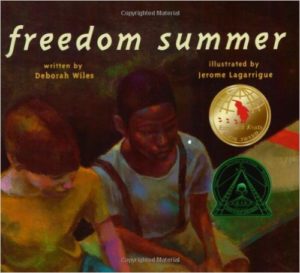 Freedom Summer by Deborah Wiles and illustrated by Jerome Lagarrigue won both the 2002 Ezra Jack Keats Award as well as a Coretta Scott King Award. It begins with two friends enjoying the leisurely pace of summer, hanging around, being friends together, swimming in a local creek. “John Henry swims better than anybody” the narrator knows. They ecstatically anticipate the prospect of the local community pool’s opening day. But, when they arrive at the gates, the boys discover that the facility has been bulldozed. No one will swim there again.
Freedom Summer by Deborah Wiles and illustrated by Jerome Lagarrigue won both the 2002 Ezra Jack Keats Award as well as a Coretta Scott King Award. It begins with two friends enjoying the leisurely pace of summer, hanging around, being friends together, swimming in a local creek. “John Henry swims better than anybody” the narrator knows. They ecstatically anticipate the prospect of the local community pool’s opening day. But, when they arrive at the gates, the boys discover that the facility has been bulldozed. No one will swim there again.
Why?
Because this story takes place in a segregated America. In 1960, laws ensured blacks could not share facilities with whites. After desegregation legislation passed, instead of complying, Mobile, Alabama opted to close the town pool, ice cream parlor, and roller rink. Hate and prejudice blinded people to fairness and the rights of all citizens to equality and access to facilities. To deny blacks access, they denied the entire community access.
This award-winning book splendidly captures the boys’ friendship so when they encounter the closed pool, the reader feels dazed by the community’s betrayal. The conversations this book might open are important one on issues such as racism, prejudice as well as loyalty, friendship and thinking for oneself.
The forward by the other offers additional insights about her motives for writing the book as well as her personal encounters with segregation during her own childhood.

AQ Lens:
The potential for adoption-related conversations is broad. In addition to racial and cultural bias, adoptive families frequently encounter bias against their families. Our family ties are often questions in terms of permanency, depth and reality. This book can help families talk about standing up for ourselves as well as being a voice for others who face discrimination and bias.
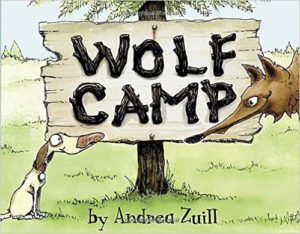 Wolf Camp written and illustrated by Andrea Zuill will delight both adults and young readers. Zany illustrations ripe with energy and humor chronicle the journey of one lovable dog as he tries to get in touch with his inner wolf. His fellow campers include a charming group of canine companions–a chihuahua named Pixie and a golden retriever named Rex. Together they learn to punch through fear, master new skills and make new friends and pull together–all admirable tasks whether you are a dog or a human!
Wolf Camp written and illustrated by Andrea Zuill will delight both adults and young readers. Zany illustrations ripe with energy and humor chronicle the journey of one lovable dog as he tries to get in touch with his inner wolf. His fellow campers include a charming group of canine companions–a chihuahua named Pixie and a golden retriever named Rex. Together they learn to punch through fear, master new skills and make new friends and pull together–all admirable tasks whether you are a dog or a human!
One illustration depicts Homer’s letter to home. It’s a classic. Any parent who’s sent kids to camp has probably received a similar letter. Wolf Camp is a delight with an important–and very subtle–message about daring to face fears, take on new experiences, make new friends, and grow into a stronger person.

AQ Lens:
Like the other books reviewed in this post, readers will see the value of friendship, the benefit of being open instead of limited by bias and the willingness to dare–to be stronger, braver and more open-minded. These are great lessons for all kids but especially for adopted children who throughout their lives will frequently be treated as “other” simply because they were adopted.
The conversations which this book might open can include topics like defeating fear, trying new things, and walking in the “shoes” of others.
